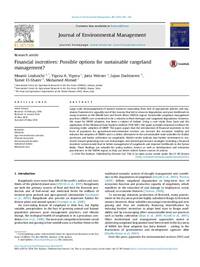Financial incentives: Possible options for sustainable rangeland management?

Authors:
Large-scale mismanagement of natural resources emanating from lack of appropriate policies and reg- ulatory framework is arguably one of the reasons that led to resource degradation and poor livelihoods in many countries in the Middle East and North Africa (MENA) region. Sustainable rangeland management practices (SRMPs) are considered to be a solution to feed shortages and rangeland degradation. However, the scope for SRMP adoption, has been a subject of debate. Using a case study from Syria and the application of the Minimum Data Analysis method (TOA-MD), this paper provides empirical evidence for ensuring wider adoption of SRMP. The paper argues that the introduction of financial incentives in the form of payments for agricultural-environmental services can increase the economic viability and enhance the adoption of SRMPs and is a better alternative to the unsustainable state subsidies for fodder purchases and barley cultivation on rangelands. Model results indicate that further investment in rea- search toward generating low cost technologies and tailored governance strategies including a financial incentive system would lead to better management of rangelands and improve livelihoods in the Syrian Badia. These findings are valuable for policy makers, donors as well as development and extension practitioners in the MENA region as they can better inform future courses of actions.
